Dartmouth-Hitchcock Medical Center Development
Honoring "triumph"
By Sandy Adams
Former DMS Dean Carleton Chapman died on December 10, 2000, at the age of 85. A few months before Chapman's death, a Dartmouth College graduate and former College administrator, Gilbert Tanis, had created the Carleton B. Chapman, M.D., Scholarship Endowment Fund, to honor the retired dean, who had also been Tanis's neighbor in recent years.
When Carleton Chapman arrived at Dartmouth Medical School in October 1966 as DMS's eighth dean, he brought with him distinguished credentials and an energetic commitment to overseeing the evolving institution's further expansion and maturation. He would need both to lead the School during a time of great transformation.
"I remember he was asked to take over the dean's post when [DMS] was in the process of moving from a two-year school to a four-year one," recalls Gil Tanis, who at the time was executive officer for Dartmouth College's president, John Sloan Dickey. "That would be a big job for anyone."
By count of years, Dartmouth Medical School was an exceptional and venerable institution when Chapman took office; it had been in continuous existence for 169 years and was the country's fourth-oldest medical school. Yet the institution he took leadership of was, in fact, exhibiting the behavior of a young, twoyear school seeking reaffirmation as a full-fledged medical school.
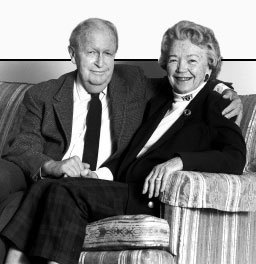
|
|
Gilbert Tants and his late wife Frances (pictured in 1994) created a scholarship endowment in honor of former DMS Dean Carleton Chapman. Photo by Stephanie Wolff. |
As Chapman wrote in the introduction to his 1973 history of DMS, Dartmouth Medical School: The First 175 Years: "Periods of turbulence and moments of triumph are inevitable in the lives of medical schools, and Dartmouth has had its share of both." Certainly, as Chapman, an experienced physician and administrator, took up the reins, the School was still closer to its "periods of turbulence" than to its "moments of triumph."
The word "change" must have been on Chapman's lips often during his time as dean. It was during his tenure that the long-hoped-for reintroduction of the M.D. program took place and the School could once again reassert itself as a major national player in medical education.
|
It was during Chapman's tenure in the deanship that the long-hoped-for reintroduction of the M.D. program took place and the School could once again reassert itself as a major national player in medical education. |
DMS's long history had most recently included the decades-long ef fects of the discontinuance of the M.D. program in 1914, during a major realignment of medical education throughout the United States. Although this nationwide shift toward greater emphasis on clinical education led to the complete closure of many medical schools, where the curriculum was deemed inadequate, DMS was judged only to have insuf- ficient clinical variety to offer a full degree program, for Mary Hitchcock Memorial Hospital was then barely 20 years old and had just 36 beds. So Dartmouth continued to offer the first two, preclinical years of medical education, with its graduates transferring elsewhere to complete their M.D.'s. Then, in the mid-1950s, the Dartmouth Trustees committed to a "refounding" of the School, an effort that was launched with the 1956 recruitment of Marsh Tenney, M.D. In time, DMS also established a formal relationship with the clinical departments at Mary Hitchcock, opening the door for the School's reestablishment as a degree-granting medical school shortly after Chapman's arrival. [See pages 3 and 65 in this issue for more about Chapman's background and contributions to Dartmouth.]
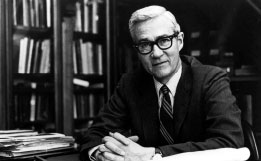
|
|
Chapman (pictured above in 1970, during his tenure as dean) died in December. Among the achievements of his deanship were the raising of funds to construct the Vail building and Chilcott Auditorium (below) and the addition of a fourth floor to Dana Biomedical Library (bottom). |
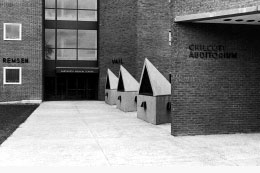
|
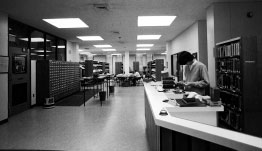
|
When Chapman arrived at DMS in 1966, the faculty numbered 60 and each of two classes had 48 students. By the time he stepped down in February of 1973, the School was about to graduate its first class of M.D.'s in nearly 60 years; the faculty had nearly doubled to more than 100; sponsored research had more than doubled; the student body had reached nearly 200; and a strong clinical teaching program and clinical department structure was in place. In addition, funds had been raised to construct Vail and Chilcott and a fourth floor had been added to Dana Biomedical Library. The era of turbulence was fading into the past, giving way to triumph.
Among those witnessing firsthand Chapman's efforts during those years was Gil Tanis, a 1938 Dartmouth College graduate who had returned to serve his alma mater after a career in private business. The decision to establish a scholarship as a tribute to the former DMS dean seemed perhaps a logical choice for Tanis. He had served as a development officer for the College during the 1950s as well as an administrator for other College initiatives.
Tanis and his wife, Frances, who died this past September, had also been generous supporters of both the College and the Medical School. Among their many gifts over the years was the creation of the Herbert Morehouse Scholarship Fund at the Medical School in memory of Mrs. Tanis's grandfather, a surgeon.
More recently, in July of 2000, the Tanises—by then residents, like Chapman and his wife, Ruth, of the Kendal at Hanover retirement community —had started to set up another scholarship fund, in honor of their Kendal neighbor.
|
You cannot do a kindness too soon, for you
never know how soon it will be too late. |
Nevertheless, Tanis pauses thoughtfully before answering when asked where the idea to establish the Chapman Scholarship Fund came from. "I was sitting in my car, down near the site of the old Hospital," he recalls. "I had gone down there for something, a meeting, I think. I don't know where the thought came from," he admits. It was "just that I really ought to do something for Carleton Chapman, who had done so much for the Medical School. I went back home and asked Frannie, my wife, and she thought it would be a good idea."
Gil Tanis is quick to point out that the initiative isn't all his doing, noting that it's a collaborative effort which he simply started. Tanis is hopeful now that others—students, faculty, alumni, other friends of Chapman's—will also contribute to the fund, so it will grow and become an ever-stronger resource for DMS students needing scholarship assistance. "It's very much a joint venture," he concludes.
Sandy Adams is a contributing editor of DARTMOUTH MEDICINE magazine.
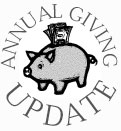
By Lisa Webster Drucker
Director of Annual Giving
603/650-4044
Dartmouth Medical School Annual Fund: Thanks to the support of our very generous alumni and friends, we are well on our way to a banner year. In the month of December alone, DMS alumni contributed over $50,000 to the Medical School Annual Fund. Gifts to the DMS Annual Fund reflect a continuing commitment to the quality of the School's educational experience by supporting student scholarships, research, and medical training. With your gift to DMS, you are helping the next generation of physicians to reach their personal best as they prepare themselves to serve the nation in the 21st century.
Dartmouth-Hitchcock Annual Fund: This is shaping up to be an outstanding year for the Dartmouth-Hitchcock Annual Fund. Over 600 gifts from new donors have been recorded already, and more are rolling in every day. This generous support from new and existing donors, from near and far, helps to underwrite everything from specialty inpatient programs to important equipment purchases to charitable patient care. Please call 603/650-4044 if you would like to make a contribution.
